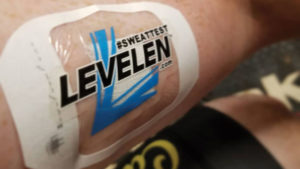Runner’s diarrhea – it is not fun and it can be fixed with a few simple nutrition tweaks.
Having worked with both distance runners and endurance athletes, getting the runs on the run usually happens when you are doing the longer distances, usually longer than 8 miles, and more likely over 12-14. In an Ironman, it usually happens on the second half of the marathon. This i experienced personally in 1999- on the second loop in Lake Placid, I had to run into the bushes at least 6 times! And this never happened in training.
There can be many causes of runner’s diarrhea, but what I have found with my clients is a combination of safeguards need to be put into place:
– structure your meals especially the day before a long run
– get your hydration protocol dialed in
– avoid certain foods the day or two before a long run
It seems this type of diarrhea only occurs on long runs over 8 miles, and more so over 12. Not to say it won’t happen on others, but dehydration starts to creep in 1-2 hours into a run and can be a trigger.
When you are dehydrating, the body is under stress. When it is under stress, often the body wants to eliminate things from the stomach or the bowels., often quickly without much warning.
I had 1 female client, who came to me. When I asked about her nutrition the day leading up to her longer runs, the ones where this runner’s diarrhea was happening, she said ‘it’s all over the place, there is absolutely no structure to it’. So we started with putting structure into her meal plan during the week leading up to the longer runs.
What I mean by structure is to plan the timing of the meals, and also what is in those meals to help balance the blood sugar. First concentrate on eating a meal every 4 hours. You definitely do not want to skip meals the day before your long runs – you will definitely feel flat. But this is what was contributing to the unwanted bowel movements while they were running. We structured the meals, and
Voila – it worked! And any time, she is off that structured plan, she gets hit with the runs or an extra bowel movement while running.
I have also worked with clients who are dehydrating and one of the signs of dehydration is diarrhea. This diarrhea also causes even more dehydration as you lose both fluids and your bowel contents. I have had this in that Ironman I mentioned, too not knowing I was dehydrating! and yup, I just accelerated the dehydration…so much that I ended up in the hospital after the race and received 5 IV’s. oops.
So if the structured nutrition is not quite enough, I always look at hydration. I often suggest not just adding electrolytes during the run, but to preload the day leading up to the long run.
Then we review the timing of fluids and electrolytes so dehydration can be averted.
Ideally, start with adding 300 mg of electrolyte salts per hour – a little bit every 20 minutes rather than 300 mg all at one time. Your goal for fluid intake is 14 ounces minimum per hour. With running, it can be exceedingly difficult to get in much more than that as when you are running, the body doesn’t want to process fluids – it is stressed with carrying your body weight and running. It is not focusing on digestion or food or fluids.
If your stomach is sloshing, often this can be cured with a dose of electrolytes, too. But again, no more than 300 mg or you may feel sicker.
Often I suggest the client get a sweat rate test done (I use Levelen and offer NIMPA code for a discount to my clients). This is a game changer as some people sweat out 300 mg while others 2000 mg per hour. Knowing your sweat numbers helps drastically with creating that protocol for hydration. Finding the right combination of products…well, that is an article on its own!
For me, I sweat about 1200 mg per hour on the run. No wonder I dehydrated and got the runner’s diarrhea on that Ironman – I was only taking in about 300 mg per hour. I didn’t know and I was taking in some electrolytes, but not nearly enough to avoid the runs on the run. If I only knew then what I know now….I would have not had those trips into the bushes and would have been able to maintain my run pace and finish probably 45 minutes faster. (If you want to know signs of dehydration, please go here)
Let me know if you need some personalized attention with structuring your meals or with your hydration protocol. As an athlete and sports nutrition coach, my job is to help you perform better! And trust me, I have been there, done that. It is different for each person and so much easier when you work with someone like me who understands what it is you need to tweak, plus it will save you time guessing!
Schedule your chat now and let’s see how we can work together so you perform better!